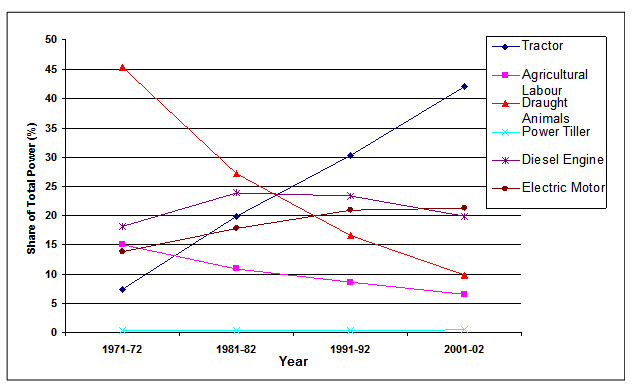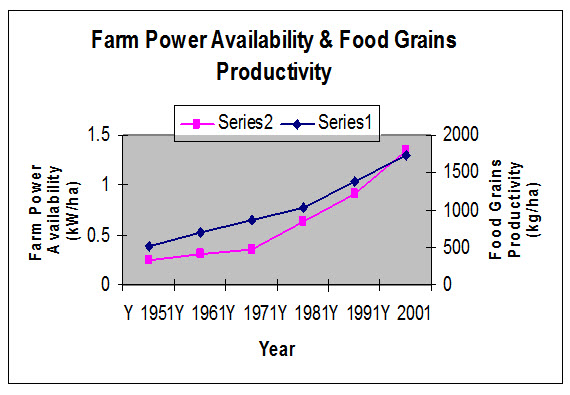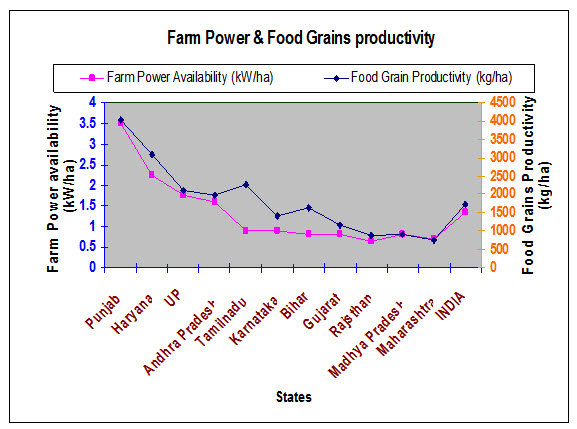Site pages
Current course
Participants
General
Module 1. Classification of Farm Power Sources
Module 2. Classification of IC Engines & Therm...
Module 3. Performance Characteristics
Module 4. Engine Components
Module 5. Engine Operating System
Module 6.:Engine Fuel System
Module 7. Engine Governor
Module 8. Engine Cooling & Lubrication system
Module 9. Engine Ignition System
26 April - 2 May
LESSON 1. NEED OF FARM PPWER
1.1 Introduction
Farming system involves multiple farm operations which are to be performed by using various farm power sources available at farm. The sources of farm power can be classified into different categories depending upon its availability and usage. This module will deal with the need and importance of various farm energy sources in farming system and also mention the availability of farm power sources being used for performing various farm operations in crop production and post harvest operations.
In Agriculture production system various energy sources are used and converted into intended work output. Where agriculture has to face the challenges of region specific climatic changes/fluctuations and also the market forces in today’s global economy, the timeliness of farm operations and availability of adequate farm power become very crucial for increasing production and productivity and handling the crop produce and also to reduce losses. With the increase in cropping intensity the turn around time is drastically reduced and it is not possible to harvest and thresh the standing crop and prepare seed bed and do timely sowing operations of subsequent crop in the limited time available, unless adequate farm power is available. Agricultural labour, draught animals, tractors, power tillers, diesel engines and electric motors are the major sources of power used for farm operations.
The usage of tractor and electro-mechanical (diesel engines& electric motors) farm power sources has been increasing continuously in Indian agriculture. The bullock drawn cultivation where draft animals were being used, tractors and power tillers have replaced draft animals as the major source of farm energy. Similarly, the availability of human labour for farm operations is also decreasing with time which results into adoption of alternate energy sources to do various farm operations.

1.2 Farm power usage and farm productivity
Regions with high agricultural productivity use very high level of farm power as compared to developing countries which usually have low levels of agricultural productivity. This can be clearly observed from the trends shown in past few decades in India, where agricultural productivity has grown significantly with the increase in farm power (kW/ha) availability over the years and also in the specific regions/states of the country, agricultural productivity has the direct relation with farm power availability. States with more farm power usage for performing timely operations, have more agricultural productivity.


1.3 Timeliness cost
Another aspect of energy consumption pattern in agriculture is of its peculiar nature. Agriculture is a seasonal industry where demand of energy fluctuates throughout the year and varies with crop production requirements. There are certain months of the year when agriculture demands more energy to meet its requirements to complete the crucial operations like sowing, transplanting, harvesting & threshing etc. in time. The delay in farm operations may result into increase in timeliness losses which further leads to decrease in the overall profitability of farm. These fluctuations in farm energy requirements must be taken into considerations while planning the resources to meet the energy demand of agriculture fully.